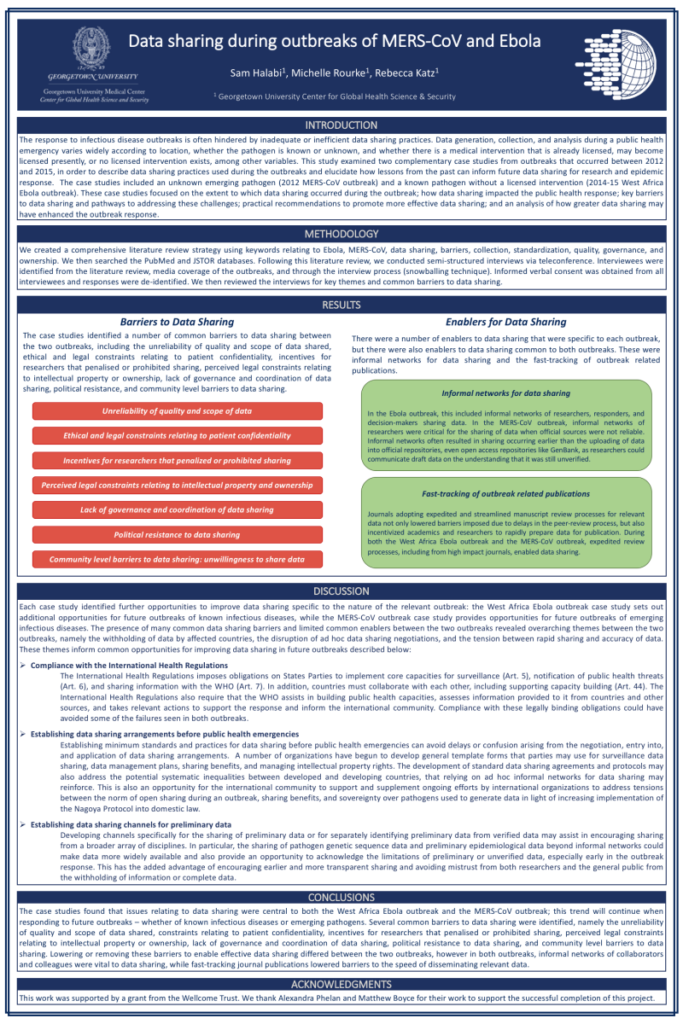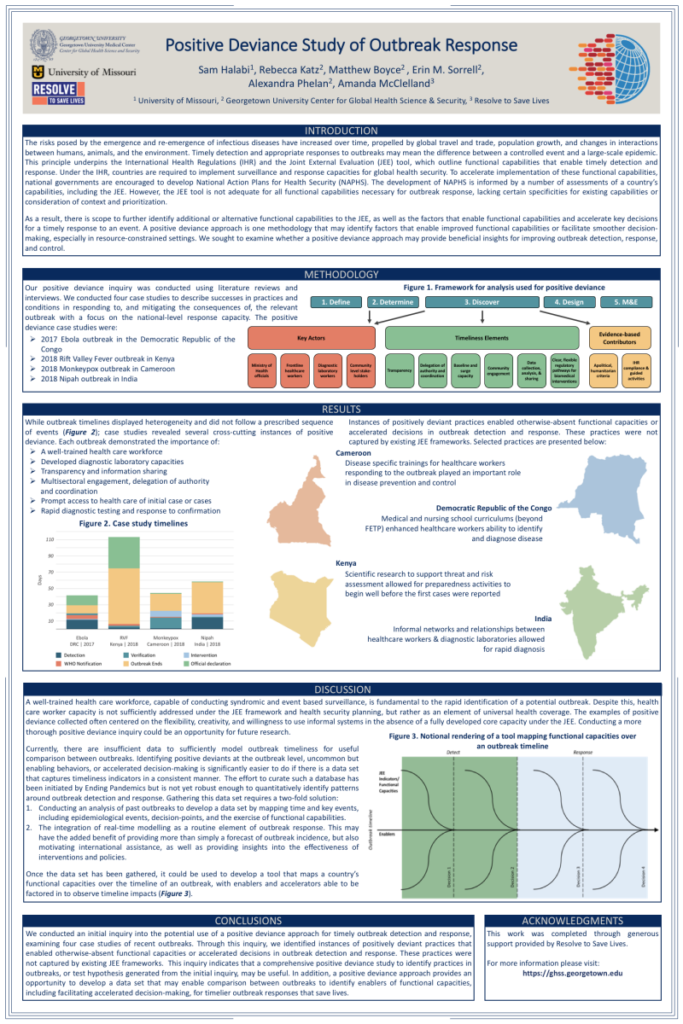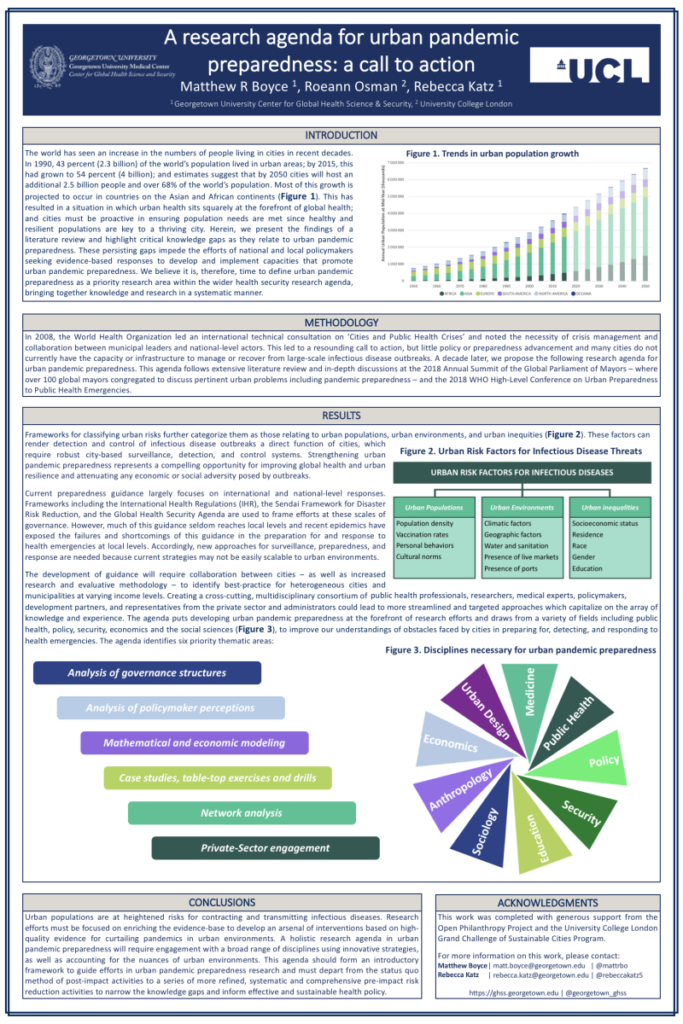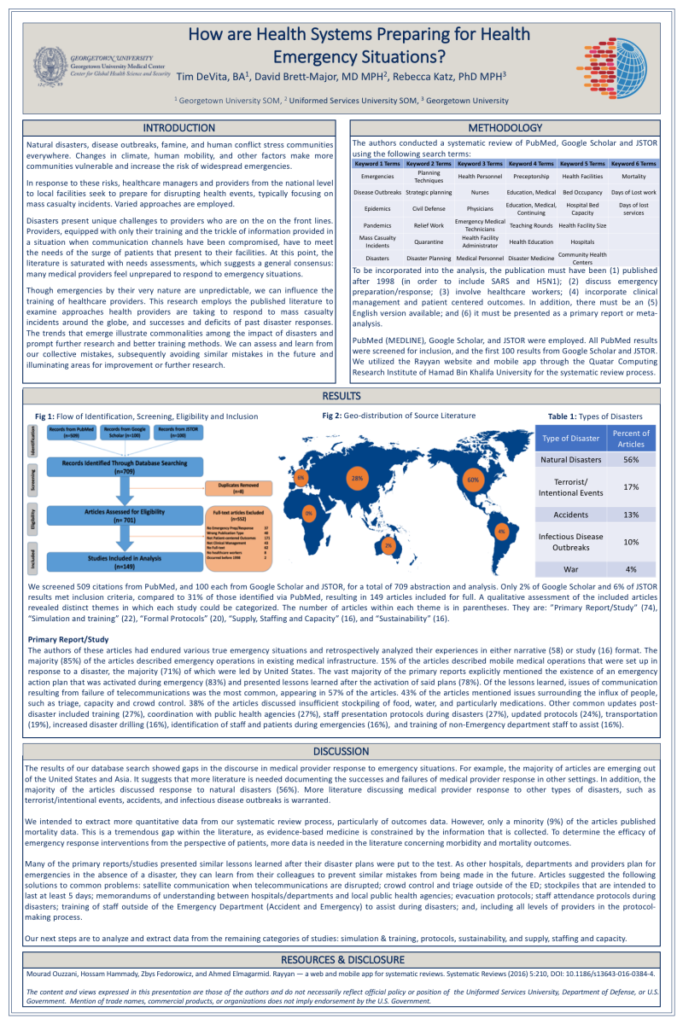First International Global Health Security Conference (GHS 2019)
In the wake of the 2014 West African Ebola outbreak, the international spread of Zika, the ongoing transmission of antimicrobial resistance, and the ever-present threat of another influenza pandemic, global health security has taken on a new level of importance. Multiple commissions and high-level panels have been held, recommendations have been issued, and governments, international organizations, civil society, and private industry have all committed to various initiatives aimed at improving health outcomes. Even so, significant challenges remain. In this context, Rebecca Katz and Adam Kamradt-Scott – with the assistance of the Organizing Committee (Matthew Boyce and Felix Rothery), the Steering Committee, and the Scientific Committee – convened the first International Global Health Security Conference (GHS 2019)
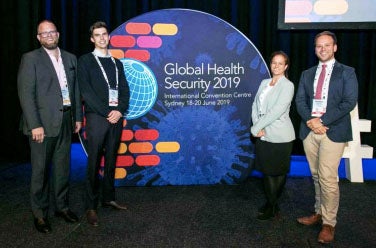
In total, over 800 members of the global health security community gathered in Sydney in June 2019, to participate in the conference. Participants came from over 65 countries, representing academia, local, national and international governmental and non-governmental organizations, public and animal health and security professionals, and the private sector, all committed to advancing global health security. The Sydney Statement on Global Health Security was presented as a product of this conference.
Faculty and staff from the Center for Global Health Science and Security participated in the landmark conference by presenting numerous oral and poster presentations as well as by moderating panels.
Oral Presentations at GHS 2019:
- Boyce MR. Synergies between Global Fund-supported activities and health security: case studies in Kenya, Uganda, and Vietnam.
- Halabi S. Legal and Regulatory Preparedness for Public Health Emergencies.
- Phelan A. Legal barriers to the sharing of influenza vaccines with GISRS: implications for global health security.
- Sorrell EM. Advancing Laboratory Biorisk Assessment Tools and Policies in Libya’s Public Health and Veterinary Laboratories.
- Sorrell EM. Creating Tools and Building Capacity for Implementation of the International Health Regulations in Iraq.
- Standley CJ. Building Public Health Capacity in Guinea Through Global Health Security Partnerships: Outbreak Response and Recovery in 2015-2018.
Presentation Slides - Stoto M. Getting the most from After Action Reports to improve global health security.
Presentation Slides
Poster Presentations at GHS 2019:
Halabi S., Rourke M., Katz R. (2019). Data Sharing During Outbreaks of MERS-CoV and Ebola.
Halabi S., Katz R., Boyce MR., Sorrell EM., Phelan AL., McClelland A. (2019). Positive Deviance Study of Outbreak Response.
Boyce MR., Osman R., Katz R. (2019). A research agenda for urban pandemic preparedness: a call to action.
DeVita T., Brett-Major D., Katz R. (2019). How are Health Systems Preparing for Health Emergency Situations?
Panels Moderated at GHS 2019:
- Fischer JE. Enhancing Laboratory Capacity Panel. First International Conference on Global Health Security. Sydney, Australia.
- Fischer JE. Game Changers for Global Health Security Panel. First International Conference on Global Health Security. Sydney, Australia.
- Phelan AL. IHR Implementation Progress Panel. First International Conference on Global Health Security. Sydney, Australia.
- Sorrell EM. Post-Ebola Capacity Building in Guinea Panel. First International Conference on Global Health Security. Sydney, Australia.
- Standley CJ. Malaria Panel. First International Conference on Global Health Security. Sydney, Australia.
Other GHS 2019 Events
- Boyce MR., Katz R. The research agenda for urban pandemic preparedness: a roundtable discussion.
Presentation Slides - Fischer JE. GHS 2019 Workshop: Contribution through Collaboration: Roles for Non-Governmental Actors in Messaging and Implementing the Global Health Security Agenda.
- Phelan AL. Global Health Law Seminar: Has International Law prepared us for the next pandemic? The International Health Regulations (2005) on Trial.
- Stoto M. WHO Side Event: After Action Review and Preparedness Capacity Building.
Presentation Slides
Sydney Statement on Global Health Security
Global health security is a state of freedom from the scourge of infectious disease, irrespective of origin or source. It is achieved through the policies, programmes, and activities taken to prevent, detect, respond to, and recover from biological threats. There are numerous challenges that pose significant risk to global health security, including a wide array of pathogens that present an existing and ongoing threat to both individual and collective health, antimicrobial resistance (AMR) and the emergence of currently untreatable infections, the potential for deliberate use of a biological weapon, and the synthesis of eradicated or novel pathogens. The complexity of addressing these challenges is amplified by a multitude of contextual factors. These threats know no borders and have global consequences requiring more effective collective action. Addressing global health security threats should be guided by the following set of principles:
- Global health security interventions must strive to be inclusive, equitable, and data driven.
- A minimum level of disease prevention, detection, and response capabilities are critical for all countries, as epidemics anywhere threaten the health of everyone. Achieving global health security is also intricately linked with efforts to achieve universal health coverage, efforts to strengthen other vital aspects of broader health and security systems, and the Sustainable Development Goals.
- Governments must cooperate programmatically, organizationally and financially to foster compliance with the International Health Regulations and other associated legal and regulatory agreements to ensure effective global governance of public health emergencies, and in so doing, encourage international organisations and NGOs to maintain the integrity of international norms, respect for human rights, and social justice. Transparent discussion, sharing, and measurement of global health security capacities is vital for achieving this goal.
- Achieving global health security requires individual, group, and systems decision making and activities that strengthens capacity across all levels of societal interaction and disciplines. Making the world a healthier, more equitable, and safer place requires action and engagement from all, including the philanthropic, public and the private sector.
- Global health security must embrace a One Health approach, not only to prevent and respond to disease, but also to protect ecosystems that underpin human, animal, and environmental health. All relevant sectors must be meaningfully involved and engaged, including heath, agriculture, environmental, security, and other vital components.
- Countries with higher capacity to respond to adverse public health events have a moral and ethical duty to work in partnership with those with lower capacity to strengthen their capabilities in a sustainable manner.
- International partners and national governments must commit to sustainable, comprehensive funding mechanisms to support global health security. Long-term strategic thinking for global health security must be supported by a diverse, inclusive community of practice, committed to providing the best evidence possible to inform transparent decision making. Achieving global health security requires commitment to the above principles, and the institutional arrangements that advance them globally, to reduce infectious disease threats, including local empowerment, capacity building, data and benefits sharing, transparency, and accountability. Stronger health systems, Universal Health Coverage, and Health-In-All-Policies, from the local to the global levels are all dependent upon and supportive of global health security.
To indicate your support by signing the Sydney Statement on Global Health Security, click here.
Other Materials
Katz R. Global Heath Security 2019: Solidifying a Community of Practice. [Web Blog]. Texas A&M University: Scrowcroft Institute of International Affairs.



